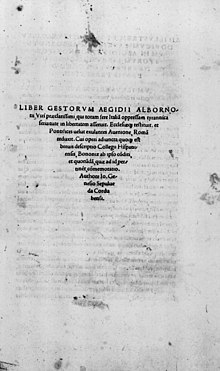Juan Ginés de Sepúlveda
Juan Ginés de Sepúlveda (* 1490 in Pozoblanco , Córdoba ; † November 17, 1573 ibid) was a Spanish humanist , historian and translator.
Life
Sepúlveda studied philosophy in Alcalá de Henares and theology in Sigüenza and at the University of Bologna , where he got to know Italian humanism . Charles V made him one of the educators and teachers of his son Philip .
Sepúlveda was highly regarded for its elegant Latin style and wrote a history of the government of Charles V (r. 1516–1556). He was a follower of Aristotle and translated his politics as well as the commentary of Alexander von Aphrodisias on Aristotle's metaphysics . In his Democrates age he defended Spain's right to wage war and to enslave the Indians ; he justified this with an alleged inferiority compared to other people. In 1550 he took part in a disputation with Bartolomé de Las Casas on the future treatment of the Indians; In this disputation of Valladolid (Junta de Valladolid) he again represented the thesis of the inferiority of the indigenous people. Living secluded on his estate, Sepúlveda served the Spanish crown until his death.
Fonts
- Liber gestorum Aegidii Albornotii ( la ). Girolamo Benedetti, Bologna 1521.
- Gonsalus sive de appetenda gloria , 1523.
- De fato et libero arbitrio , Roma, 1526.
- Cohortatio ut bellum suscipiat in Turcas , 1529.
- De ritu nuptiarum et dispensatione , Roma, 1531.
- De convenientia militaris disciplinae cum christiana religione qui inscribitur Democrates , Roma, 1535.
- Alexandri Aphrodisiei Commentaria in dvodecim Aristotelis libros De prima philosophia, interprete Ioanne Genesio Sepulveda , Parisiis, Dimon de Colines, 1536.
- De rebus gestis Caroli V
- De rebus gestis Philippi II
- Democrates secundus sive de iustis belli causis ... , 1544.
- Apologia pro libro de justis belli causis , 1550.
- Epistolarum libri septem , 1557.
- Historia de bello administrato in Italia ( la ). Antonio Giaccarelli & Pellegrino Bonardo, Bologna 1559.
- De regno libri III , 1570.
- Opera omnia ( la ). Arnold Mylius, Cologne 1602.
- Democrates age , 1892.
literature
- Josef Bordat: Juan Ginés de Sepúlveda. In: Biographisch-Bibliographisches Kirchenlexikon (BBKL). Volume 27, Bautz, Nordhausen 2007, ISBN 978-3-88309-393-2 , Sp. 1343-1345.
- Horst Pietschmann : Aristotelian humanism and inhumanity? Sepúlveda and the Native Americans . In: Fernando Inciarte , Berthold Wald (ed.): Human rights and development. In dialogue with Latin America (= Bibliotheca Ibero-Americana, vol. 39). Vervuert, Frankfurt am Main 1992, ISBN 3-89354-539-5 , pp. 145-162.
Footnotes
- ↑ Manuel Fernández Álvarez : Felipe II y su tiempo . Espasa, Madrid 1998, p. 649.
- ^ Juan Ginés de Sepúlveda: Democrates segundo o de las justas causas de la guerra contra los Indios. Edición crítica bilingüe , translated and commented by Ángel Losada. Consejo Superior de Investigaciones Científicas (CSIC), Madrid 1951, p. 15 and more often.
Web links
- Literature by and about Juan Ginés de Sepúlveda in the catalog of the German National Library
- Sepúlveda on the Spanish conquest of America (excerpt from: Demokrates secundus, 1544/45)
| personal data | |
|---|---|
| SURNAME | Sepúlveda, Juan Ginés de |
| BRIEF DESCRIPTION | Spanish Dominican, humanist, historian and translator |
| DATE OF BIRTH | 1490 |
| PLACE OF BIRTH | Pozoblanco , Cordoba |
| DATE OF DEATH | November 17, 1573 |
| Place of death | Pozoblanco , Cordoba |


